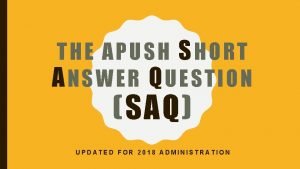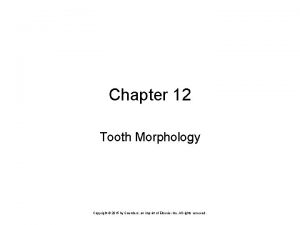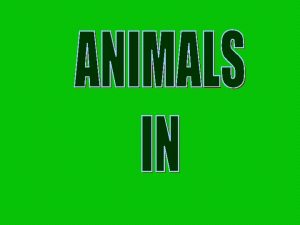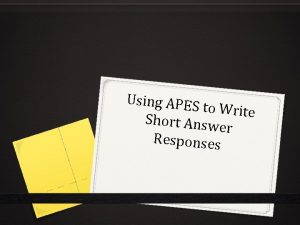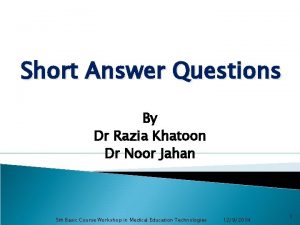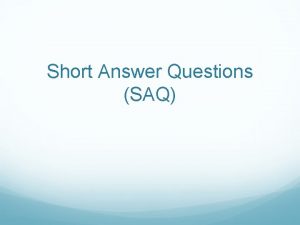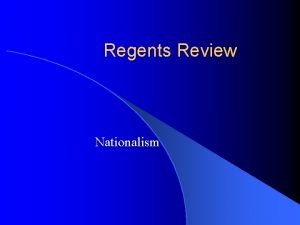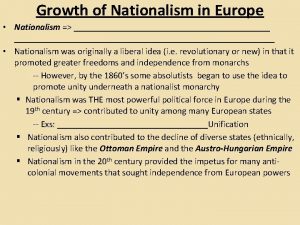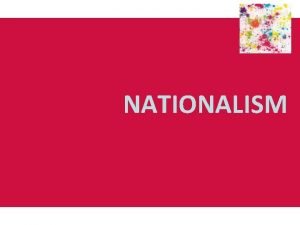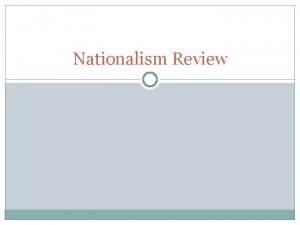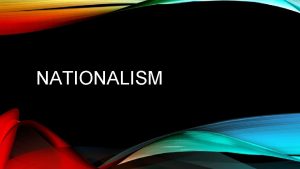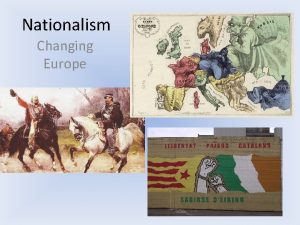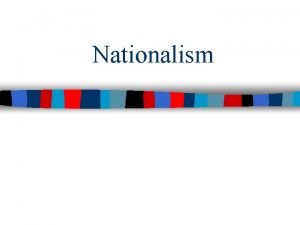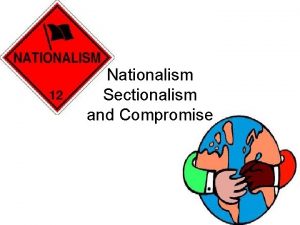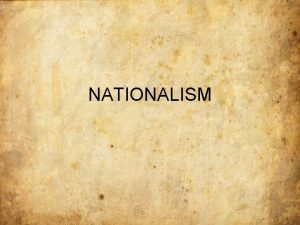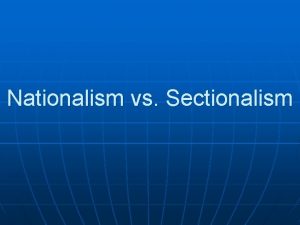NATIONALISM Short Answer Questions Short Answer Questions are





















- Slides: 21

NATIONALISM Short Answer Questions

ØShort Answer Questions are marked out of 15 5 marks for knowledge/understanding; 7 marks for analysis and evaluation; 3 marks for quality of communication. ØYou should spend 15 mins on each answer – 250 to 300 words. ØQuestions may have two parts eg: How and why (answer both) ØAnswers should be concise – you do not need an introduction or a conclusion. The questions focus on narrow parts of the specification – this will usually require a definition and explaining why or how concept you are looking at is important. ØAnswers require precise definitions, an accurate use of terminology, supporting facts, quotations and names. ØUnit 4 examines ideological traditions that have developed out of, or emerged in opposition to, liberalism, conservatism and socialism. Questions in Unit 4 are more likely to look at links/criticisms associated with liberalism, conservatism and

Short answer questions tend to fall into the following categories: ØNations and states (confusion between the terms and the reasons nationalists support the nation-state) ØNations and races (confusion between the terms and nationalism and racialism) ØDifferent types of nationalism (eg political and cultural, how other ideologies such as liberalism are linked to nationalism)

Short answer questions could also focus on areas such as: Ølinks between conservatism and nationalism Ø how and why liberalism is associated with internationalism Øhow and why socialism is associated with internationalism

Questions on Nations and States Typical questions: Distinguish between nations and states, and explain why the two terms are often confused. Why have nationalists regarded the nation-state as a political ideal?

Distinguish between nations and states, and explain why the two terms are often confused. A nation is a group of people bound together by shared values and traditions who see themselves as a natural political community and usually occupy the same geographical area. Nations are formed by a mixture of cultural factors (objective factors) and psycho-political factors (subjective factors) State - institution in a society that exercises supreme power within a defined geographical area. Weber – described the state as having 'the monopoly of the legitimate use of physical force'

Distinguish between nations and states, and explain why the two terms are often confused. Nations and states are often confused for two reasons: the complexity of national identity and the success of nationalism v complexity of national identity A Nation is not just a group of people bound together by shared values and traditions, nations also see themselves as a natural political community – this aspect is associated with a desire to establish or maintain statehood. In this sense, nations are nations because they seek to become states, states thereby blurring the distinction between nations and states. vthe success of nationalism The aim of most nationalists is the creation of the nation state. Mazzini: 'Every nation a state, only one state for the entire nation. ' The success of nationalism, means that nations and states tend to overlap in the modern world , ie many nation-states exist (here nationality and citizenship overlap). The United Nations is an example of this confusion – it is an organisation of states rather than nations.

Why have nationalists regarded the nation-state as a political ideal? Define nation-state. Arguments are mainly linked to liberal nationalists (linked to freedom) and conservative nationalists (linked to social cohesion). Reasons for it being a political ideal include: v the nation-state is associated with the goal of political freedom (national self determination). Real democracy and self-government can only operate within a nation-state. v a nation-state is the only really stable form of political organisation. This is because nation-states are united by a combination of political allegiances (via citizenship) and a high level of cultural cohesion (via nationality). All members of such a state therefore 'belong' in a civic/cultural sense. v nation-states are inherently peaceful – they will respect the right of other nation states to exist (liberal nationalism). Multinational empires are more likely to be associated with

Distinguish between nations and races, and explain why the two terms have been confused. Define a nation highlighting the blend of cultural and psychopolitical factors Because there is no agreement about the balance between these two factors, civic and organic views exist. Races, by contrast, are defined genetically; genetically they are groups of people who share a common biological descent and so are characterised by physical similarities such as skin or hair colour. Nations and races are confused when usually right-wing nationalists define the nation on organic rather than civic grounds, grounds seeing nations as historically-rooted and therefore as exclusive entities. This confusion may be implicit in conservative nationalism but is explicit in the racial nationalism of National Socialism.

Distinguish between nationalism and racialism. Nationalism is the belief that the nation is the central principle of political organisation. Nationalism is based upon two core assumptions. First, humankind is naturally divided into discrete nations and, second, the nation is the unit of political rule. Classical political nationalism is associated with national self-determination and the creation of nation states. Racialism is the belief that humankind is divided into distinct races, each possessing different physical, intellectual and moral characteristics rooted in biology or genetic inheritance. Racist doctrines either preach the need for racial segregation or advance ideas of racial superiority. Nationalism is based on cultural differences and people are seen as different but equal Racial origin is irrelevant to national identity, at least for inclusive forms of nationalism. Liberal nationalism is associated with international harmony Racialism on the other hand is based genetic differences, differences ideas of superiority and conflict You can mention that some forms of Nationalism has also been associated with a chauvinistic belief in the superiority of one nation over other nations etc. However do not do too much on this the question asks you to distinguish between nationalism and racialism not why is it difficult to distinguish between nationalism and racialism

Distinguish between political nationalism and cultural nationalism. Cultural nationalism emphasises the regeneration of the nation as a distinctive civilisation, and thus stresses the need to defend or strengthen a language, religion, or way of life rather than achieve overt political ends. This type of nationalism is associated with an organic view of the nation and is exclusive in character. Cultural nationalism is often associated with situations where a small nation feels dominated by a larger neighbour. Wales can be used as an example. Political Nationalism involves using the idea of the nation to further specific political ends. Classic political nationalism (or liberal nationalism) is based on the principle of national-self determination and the belief that the ‘nation-state’ is the best form of political organisation.

In what ways is nationalism compatible with liberalism? The question is about links between liberalism and nationalism. This is not the same as describing liberal nationalism. Liberal nationalists see nations as moral entities entitled to certain rights in the same way as individuals are moral beings. The following liberal ideas on the individual can be applied to nationalism ØIndividual: all individuals are entitled to certain rights ØIndividual Freedom ØFoundational /Formal Equality ØToleration A small number of candidates started out by identifying liberalism ideas such as individualism and a commitment to individual rights, and concluded, unhelpfully from the point of view of the question, that liberalism and nationalism are always at odds.

NATIONALISM Essay Questions

ØEssays require broader knowledge than short answer questions, but your answer still needs to be focused. Questions will be open ended - they may permit two or more legitimate answers. ØAnswers should have a beginning (introduction), a middle (argument) and an end (conclusion) ØIntroduction should: §Define key terms used in the question §Show an understanding of the point of the question §Outline argument to be adopted/conclusion favoured. This is optional ØArgument should: §Make points in a logically related order §Consider contrasting viewpoints (for/against, +s/-s, benefits/drawbacks) §Support points with appropriate evidence (make a point and prove it) §Qualify points where appropriate (however, on the other hand etc) ØConclusions §Are needed (do not ‘sit on the fence’ unless the question invites you to) §Should be short and clear. Start with a one sentence answer to the question set (in conclusion…) §Summarise key factors that support your conclusion (no new material)

Nationalism Essays Most nationalism questions usually involve looking at liberal nationalism, conservative nationalism, chauvinist nationalism and anti-colonial nationalism. The important thing is not just to write about these different forms of nationalism but focus on the question. Specific questions need specific answers. Eg ‘Nationalism is a recipe for peace and international order. ’ Discuss. This question mainly focuses on liberal nationalism and expansionist nationalism. Is nationalism a progressive or a reactionary doctrine? This question requires you to look at all of the different forms but focus on their reactionary or progressive nature.

'Nationalism is inherently expansionist and destructive. ' Discuss. The key word in this question is inherently. Weak responses produced a descriptive account of the different types of nationalism without addressing the inherently aspect and only tended to raise the expansionist and destructive aspect when describing aggressive nationalism. Expansionist (or aggressive) nationalism was well understood but there was a difference between those who described expansionist nationalism and those who explained why certain nationalists are impelled towards expansionism. The other side of the argument was often less well explained, with only the strongest candidates being able to argue that liberal and anti-colonial nationalism openly reject expansionism and destruction. This requires a clear understanding and explanation of Liberal nationalism. Most writers argue that there is no inherent link between nationalism and aggression and expansion, but opponents of nationalism have suggested that all forms of nationalism are at least tainted by aggression, based on their emphasis on cultural difference. In this view, national sentiments inevitably get entangled with chauvinism and thus are, at least implicitly, aggressive or expansionist.

‘Nationalism is a recipe for peace and international order. ’ Discuss. This is similar to the previous essay but come at it from a different angle. The idea nationalism is a recipe for peace and international order is found in liberal nationalism Liberal nationalists argue that war and conflict stem from the existence of multinational empires that are inclined towards militarism and expansionism. National self-determination is a way of establishing peaceful and stable international order. Liberals believe a world of independent nation-states can and should be regulated by international bodies, helping to establish an international order. However expansionist nationalism, nationalism which does not see nations equal entities, is associated with war and a lack of respect for international order. Some argue that these tendencies can be found in all forms of nationalism, because it highlights difference. Your conclusion depends on you view of nationalism, eg some answers argued that until 1945 nationalism had predominantly been seen as a threat to peace and international order, whereas in the post-1945 period and especially in recent decades, the decline in inter-state war can be seen as one of the consequences of the wider acceptance of national self-determination and democratic governance. However it is possible to arrive at a different conclusion.

To what extent is nationalism a single doctrine? The essay requires: Ø an explanation of why nationalism can be seen as a single doctrine - all forms of nationalism treat the nation as the supreme principle of political organisation. Ø a recognition that nationalism is characterised by significant divisions, making it appear to be a collection of distinct conflicting traditions. An explanation of the different types of nationalism and analysis of the similarities and differences between them is needed. ØLiberal nationalism ØConservative nationalists Ø Expansionist forms of nationalism ØAnti-colonial forms of nationalism A descriptive account of the different forms of nationalism is not enough The second part of the essay will be much longer that the first part. You need to look at all 4 forms of nationalism.

Is nationalism a progressive or a reactionary doctrine? You need to briefly explain what you mean progressive and reactionary Many candidates struggled with the term progressive. Some dealt with this by simply ignoring it. Others took progressive to mean ‘good’ or ‘politically acceptable’. A progressive doctrine is one that is forward looking and linked to improvement and modernization. In terms of nationalism progress is seen in terms of the creation of nation-states. This frees nations form subordination or oppression. The most prominent forms of progressive nationalism are liberal nationalism and anti-colonial nationalism. Reactionary doctrines are ones that look back to, and attempt to recreate, a lost past. Nationalism is reactionary in that it is often based on historical images and symbols, a nation’s identity being defined by its common past. The most prominent forms of reactionary nationalism are conservative nationalism and expansionist nationalism. The best responses realised that many nationalist traditions consist of a blend of progressive and reactionary features, and cannot just be pigeon-holed into one or the other category.

To what extent is nationalism a backward-looking ideology? This is similar to the previous question. Nationalism can be viewed as a backward-looking ideology in a number of senses: Nations are shaped by past experience. The backward-looking character of nationalism is particularly evident in conservative nationalism, which has been used as a defence of traditional institutions and values and as a way of preventing progressive social change. Many forms of nationalism are rooted in the image of a past ‘golden age’ an image of a national greatness that nationalists seek to regain. Cultural nationalism is widely viewed as reactionary. However, nationalism also has forward-looking or progressive features. These include the following: Liberal nationalism is associated orientated with the quest for national independence and self-government. Anti-colonial nationalism was also progressive in that it emphasised the goal of national liberation, often fusing self-determination with a belief in social development. Apparently reactionary forms of nationalism such as fascist nationalism had certain future-looking goals, such as the construction of Arian world domination.

Which political ideologies look beyond the nation, and why? This question is about internationalism. Some students misunderstood the question and wrote about ideologies which emphasise the nation. The major ideologies which look beyond the nation are liberalism and socialism. You need to explain why and how liberalism and socialism look beyond the nation. Other ideologies which look beyond the nation include feminism and ecologism. In this essay the main focus is on liberalism and socialism, socialism but you also need to briefly look at feminism and ecologism. Short answer questions are likely to ask about liberalism or socialism.
 Mikael ferm
Mikael ferm Tall + short h
Tall + short h Saq questions
Saq questions Romeo and juliet test
Romeo and juliet test Death of a salesman act 1 questions and answers
Death of a salesman act 1 questions and answers Short answer questions examples
Short answer questions examples Saq tea format
Saq tea format Saqs ap world history
Saqs ap world history Tea format saq
Tea format saq Saq format
Saq format Name the five lesions associated with hiv/aids chapter 17
Name the five lesions associated with hiv/aids chapter 17 Crq questions
Crq questions Crucible socratic seminar questions
Crucible socratic seminar questions Look at the picture ask and answer
Look at the picture ask and answer Chapter 12 tooth morphology short answer questions
Chapter 12 tooth morphology short answer questions Why does beowulf plan the tower so carefully
Why does beowulf plan the tower so carefully Ace format writing example
Ace format writing example The crossover short answer questions
The crossover short answer questions Use the photos to answer the questions
Use the photos to answer the questions Apes response
Apes response Answer of this question
Answer of this question Short answer questions
Short answer questions


